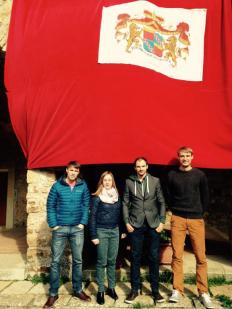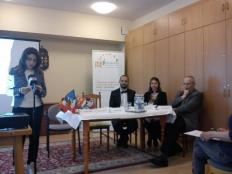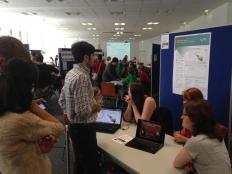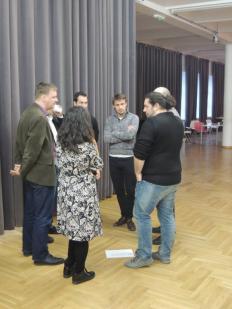Inter-cultural Dimension for European Active Citizenship
Principal Investigator at ZRC SAZU
Asst. Prof. Jani Kozina, PhD-
Original Title
Inter-cultural Dimension for European Active Citizenship
-
Acronym
IDEA-C
Project Team
Peter Kumer, Ph.D., Jernej Tiran, PhD, Asst. Prof. Jani Kozina, PhD, Maruša Goluža, PhD, Janez Nared, PhD-
Duration
1 September 2014–31 August 2016 -
Lead Partner
-
Project Leader
Federica Sottile, Nino Pietrini
-
Financial Source
Evropska komisija, EACEA, Europe for citizens programme 2014–2020
Partners
OLDHAM METROPOLITAN BOROUGH COUNCIL, SA Noored Teaduses ja Ettevõtluses , FUNDACION UNIVERSITARIA SAN ANTONIO DE CARTAGENA, Know and Can Association , The Innovation and Development Institute Principe Real, M2C Institut fur angewandte Medienforschung GmbH , Kistarcsa Város Önkormányzata, Comune di Geraci Siculo , Eprojectconsult Istituto Europeo di Formazione e ricerca , Zwiazek Stowarzyszen MULTIKULTURA, Mediter - Réseau Euro-Méditerranéen pour la Coopération a.i.s., E-Juniors, UNIVERSITY OF PIRAEUS RESEARCH CENTER
Considering the alarmingly low turnout rate in EU elections in some countries where voting is not compulsory and the democratic deficit it causes across Europe, the project aimed to restore electoral faith among EU citizens.
It addressed the four main causes for low electoral participation found in collaboration with the project partners:
- lack of interest and of knowledge of the democratic workings of the EU
- mistrust towards EU institutions
-lack of sense of belonging to Europe.
IDEA-C consisted of 13 local workshops organised from each partner organization + 4 International events.
Project's activities are summed up at IDEA-C offical website.

IDEA-C team at the kick-off meeting in Geraci Siculo, November 2014 (photo credentials: Eprojectconsult)
Project meetings:
1. Geraci Siculo
14. - 15. November 2014
At the kick-off meeting the lead partner Eprojectconsult from Italy presented aims and objectives of the project. Other partners had the opportunity to present their organisations and the concept of democracy in respective countries. The press conference was held together with local stakeholders. The structure of national workshops was defined and the web platform, created by Polish partner Multikultura, was introduced. The meeting was concluded with the cultural programme which was prepared by local community and hosted by the mayor of Geraci Siculo, Mr Bartolo Vienna.

Delegates from Slovenia at the meeting venue in Geraci Siculo (photo credentials: Anton Melik Geographical Institute).
2. Budapest
22. - 23. May 2015
The second meeting was hosted by the Kistarcsa Város Önkormányzata near Budapest. The content and debate was dedicated to democratic workings of the European Union which was highlighted by the presentations of two experts from France and Slovenia. The French expert, Patrizia Papitto, was discussing about “The European Parliament, the representation of the citizens in Europe and the influence of the Parliament on the European politics”, whereas the Slovenian expert, dr. Jernej Zupančič, provided his speech on “Improving political participation of minorities and their influence to local decision-making processes: concepts, models, practices”. The meeting continued with visiting the Central Detention and Relocation Camp of Kistarcsa and concluded with dinner and cultural programs in the Community Center of Kistarcsa.

The guest speakers from France and Slovenia presented their view on democratic workings of the European Union (photo credentials: Jani Kozina)
3. Bremen
17. July 2015
The meeting was opened by dr. Helmut Eirund and Martin Koplin, both representatives of M2C Institute which hosted the event. The focal point of the meeting was the knowledge fair where students from University of Applied Sciences presented their innovative tools used to encourage e-participation in democratic decision making among citizens of Bremen. Game participation concepts were introduced by school-kids of the Bremen Comprehensive School Centre. The meeting was followed by afternoon presentations and workshops focused on grass roots engagement to democracy and possible tools for attracting citizens to participate in urban planning decision-making. The meeting was concluded with the visit of Breminale cultural festival.

Knowledge fair prepared by students of media-informatic programme (photo credentials: Peter Kumer)
4. Krakow
13. February 2016
The final meeting was held at ARTzona Cultural Centre which is situated in residential neighbourhood of Nowa Huta in Krakow. The meeting was organised by the Polish partner Multikultura. They presented the history of the neighbourhood and the engagement of the community in revitalisation process. The meeting was concluded with the workshops focused on possible further cooperation focused on encouragement of citizens in democratic decision-making.

The workshops held at the meeting were focused on networking, future cooperation and on discussion to search for new ideas on how to continue with the project (photo credentials: Jernej Tiran)

